Article VI is a american film of genre Documentary
Article VI (2008)
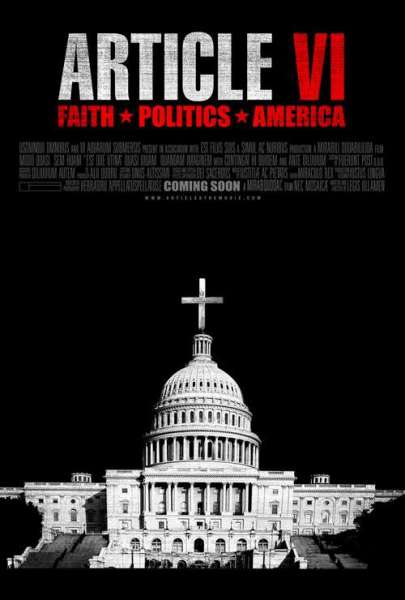
If you like this film, let us know!
- Infos
- Casting
- Technical infos
- Photos
- Videos
- Film quotes
- Characters
- Music
- Awards
Article VI: Faith. Politics. America is a 2008 documentary film about religion and politics.
Synopsis
The story follows filmmaker Bryan Hall's experience as a Mormon during the 2008 Presidential race. While following the debates, Hall becomes increasingly aware of the escalating attacks against a particular candidate over his religion: Mitt Romney, who happens to also be a Mormon. Hall decides to investigate this issue and comes to realize that the issue of religious bigotry in politics goes far beyond his own faith. It has been the subject of intense argument from the earliest days of the American colonies. In the end, Hall makes the case for the need for religious tolerance in America; not just for his religion, but for all religions.Comments
Leave comment :
Suggestions of similar film to Article VI
There are 8975 with the same cinematographic genres, 10501 films with the same themes (including 125 films with the same 5 themes than Article VI), to have finally 70 suggestions of similar films.If you liked Article VI, you will probably like those similar films :
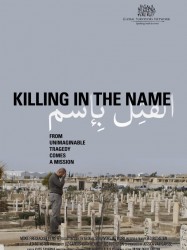
Killing in the Name (2010)
Origin USA
Genres Documentary
Themes Films about religion, Films about terrorism, Documentary films about law, Documentary films about war, Documentary films about historical events, Documentary films about politics, Documentary films about religion, Documentary films about terrorism, Political films, Films about Islam
Rating67%





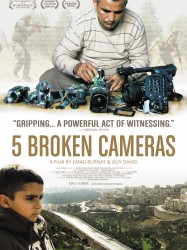
Five Broken Cameras (2011)
, 1h34Origin Israel
Genres Drama, War, Documentary, Crime
Themes Films set in Africa, Films about films, Films about religion, Documentary films about business, Documentary films about the film industry, Documentary films about law, Documentary films about war, Documentary films about historical events, Documentaire sur une personnalité, Documentary films about politics, Documentary films about religion, Political films, Films about Jews and Judaism, Documentary films about films
Rating78%





There are five cameras — each with its own story. When his fourth son, Gibreel, is born in 2005, self-taught cameraman Emad Burnat, a Palestinian villager, gets his first camera. At the same time in his village of Bil’in, the Israelis begin bulldozing village olive groves to build a barrier to separate Bil'in from the Jewish Settlement Modi'in Illit. The barrier's route cuts off 60% of Bil'in farmland and the villagers resist this seizure of more of their land by the settlers.

Origin Israel
Genres Documentary
Themes Films set in Africa, Films about writers, Films about religion, Documentary films about law, Documentary films about war, Documentary films about historical events, Documentaire sur une personnalité, Documentary films about politics, Documentary films about religion, Political films, Films about Jews and Judaism
Rating65%





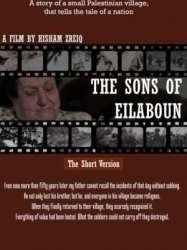
The Sons of Eilaboun (2007)
, 24minutesDirected by Hisham Zreiq
Origin Israel
Genres Documentary
Themes Films set in Africa, Films about religion, Documentary films about law, Documentary films about war, Documentary films about historical events, Documentaire sur une personnalité, Documentary films about politics, Documentary films about religion, Political films, Films about Jews and Judaism
Rating68%





The film starts with Melia Zreiq, an old woman from Eilaboun, saying: "I hope God will bring peace to this land, and let the peoples live together - a good life. I hope there will be peace". Historian Ilan Pappe talks about Plan Dalet, a plan that David Ben-Gurion and the Haganah leaders in Palestine worked out during autumn 1947 to spring 1948. Pappe discusses the details of the plan, and how was it carried out. On October 30, 1948, the Israeli army entered Eilaboun at approximately 5 AM. They then forced the villagers together in the main square of the village. They chose seventeen young men. Five of them were taken as human shield, and the rest of the twelve were killed, each in a different location. This all happened after the expulsion of the rest of the village to Lebanon, where they became refugees after a five days forced march to Lebanon. After a United Nations peace keeper observed and reported Israel was forced to allow the people back.

Interrupted Streams (2010)
, 1h15Origin Israel
Genres Documentary
Themes Films set in Africa, Environmental films, Films about religion, Documentary films about law, Documentary films about environmental issues, Documentary films about war, Documentary films about historical events, Documentaire sur une personnalité, Documentary films about politics, Documentary films about religion, Political films, Films about Jews and Judaism
Paths of lives are crossed in one village in the West Bank. Along the broken water pipelines, villagers walk on their courses towards an indefinite future. Israel that controls the water, supplies only a small amount of water, and when the water streams are not certain nothing can evolve. The control over the water pressure not only dominates every aspect of life but also dominates the spirit. Bil-in, without spring water, is one of the first villages of the West Bank where a modern water infrastructure was set up. Many villagers took it as a sign of progress, others as a source of bitterness. The pipe-water was used to influence the people so they would co-operate with Israel’s intelligence. The rip tore down the village. Returning to the ancient technique of collecting rainwater-using pits could be the villagers’ way to express independence but the relations between people will doubtfully be healed.
 , 1h24
, 1h24Origin USA
Genres Documentary
Themes Films about religion, Documentary films about historical events, Documentary films about politics, Documentary films about religion, Political films, Films about Jews and Judaism
Rating77%





Norman Finkelstein est né à Brooklyn en 1953, de parents survivants des camps de concentration nazis. En 1988, il obtient son doctorat du Department of Politics at Princeton University, sur la théorie du sionisme. Disciple de Noam Chomsky et brillant universitaire, Norman Finkelstein est l’auteur de plusieurs ouvrages traduits dans le monde entier dont L’industrie de l’Holocauste (Réflexion sur l’exploitation de la souffrance des Juifs) (La Fabrique Editions - 2000) et Mythes et réalité du conflit israélo-palestinien (Aden Editions - 2006). Mais, la liberté de ton de Finkelstein dérange, elle lui a valu en 2007 d’être licencié de l’Université DePaul (Chicago) et d’être taxé de « Juif antisémite » par des membres de lobbies pro-israéliens américains.
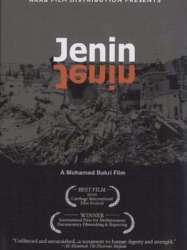
Jenin, Jenin (2003)
, 54minutesDirected by Mohammad Bakri
Genres Documentary
Themes Films set in Africa, Films about religion, Documentary films about law, Documentary films about war, Documentary films about historical events, Documentaire sur une personnalité, Documentary films about politics, Documentary films about religion, Political films, Films about Jews and Judaism
Rating73%





Jenin, Jenin est un documentaire sur ce qu'il se serait passé lors de la bataille de Jenine, dans le cadre de l'opération Rempart, dans le village de Jénine en territoire palestinien, impliquant Tsahal (l'armée israélienne) en 2002 (en réaction à une série d'attentats dont celui du 27 mars 2002 à l'hôtel Park de Netanya), où le cinéaste laisse la parole aux habitants de la ville.

Décryptage (2003)
Directed by Philippe Bensoussan
Origin France
Genres Documentary
Themes Films set in Africa, Films about racism, Films about religion, Documentary films about racism, Documentary films about law, Documentary films about war, Documentary films about historical events, Documentary films about politics, Documentary films about religion, Political films, Films about Jews and Judaism
Rating74%





Ce documentaire tente de décrypter les commentaires tenus sur le conflit israélo-palestinien et de répondre aux questions suivantes : comment parle-t-on du conflit au Proche Orient ? Comment parle-t-on de ses protagonistes ? Pourquoi ces troubles font-ils l'objet de passions aussi fortes ? Quelle est la mécanique des médias qui instruisent l'opinion ?
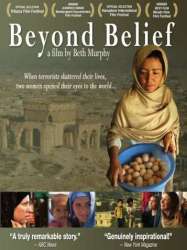
Beyond Belief (2007)
, 1h37Directed by Beth Murphy
Origin USA
Genres Documentary
Themes Films based on the September 11 attacks, Films about religion, Films about terrorism, Transport films, Aviation films, Documentary films about law, Documentary films about war, Documentary films about historical events, Documentaire sur une personnalité, Documentary films about politics, Documentary films about religion, Documentary films about technology, Documentary films about terrorism, Political films, Films about Islam, Disaster films, Films about aviation accidents or incidents, Films about hijackings
Rating48%






Genres Documentary, Historical
Themes Films based on the September 11 attacks, Films about religion, Films about terrorism, Transport films, Aviation films, Documentary films about law, Documentary films about war, Documentary films about historical events, Documentary films about politics, Documentary films about religion, Documentary films about health care, Documentary films about technology, Documentary films about terrorism, Political films, Films about Islam, Disaster films, Films about aviation accidents or incidents, Films about hijackings
Actors Steve Buscemi
Rating82%





 Connection
Connection